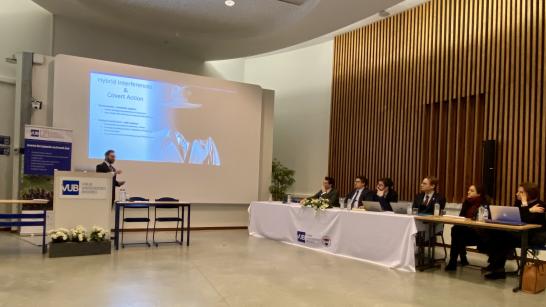
 We are pleased to announce that on 24 January 2023, Tudor Petru Fabian successfully defended his PhD thesis entitled: ‘Networks of Knowledge & Hybrid Interferences: Can the European Union defend its interests in the new era of acute international competition without effective information sharing, collation & analysis capabilities?‘ Tudor’s PhD Promotor was Prof dr Alexander Mattelaer, and the PhD jury consisted of the following members: Dr Daniel Fiott, Dr Elena Lazarou, Kenneth Lasoen, and Prof dr Olesya Tkacheva. The Brussels School of Governance would like to congratulate Dr. Tudor Petru Fabian on this wonderful achievement. Below you can read more about his PhD thesis.
We are pleased to announce that on 24 January 2023, Tudor Petru Fabian successfully defended his PhD thesis entitled: ‘Networks of Knowledge & Hybrid Interferences: Can the European Union defend its interests in the new era of acute international competition without effective information sharing, collation & analysis capabilities?‘ Tudor’s PhD Promotor was Prof dr Alexander Mattelaer, and the PhD jury consisted of the following members: Dr Daniel Fiott, Dr Elena Lazarou, Kenneth Lasoen, and Prof dr Olesya Tkacheva. The Brussels School of Governance would like to congratulate Dr. Tudor Petru Fabian on this wonderful achievement. Below you can read more about his PhD thesis.
Abstract
In the era of great power competition, relations of relative power are altered through hybrid activity in the grey zone between peace and war. As norms and identity are instrumentalised, societal fractures are exploited to promote polarisation and instability, weakening adversaries through subversive operations that distract, distort and confuse. Political channels of influence and economic dependencies are concomitantly weaponised for strategic interests.
It is in this arena that the EU seeks to maintain strategic relevance and actorness. This thesis considers whether this can be done without effective European information sharing, collation and analysis capabilities, mapping threats and related defence mechanisms in the three key clusters of geoeconomics, political friendships and information manipulation operations. The reader is presented with a diagnosis of Russian and Chinese overt and covert activities in these domains, alongside an overview of EU institutional arrangements and policy instruments that seek to boost its preparedness and resilience against such hybrid interferences.
The challenge: intricate cross-policy and cross-border threats, materialised through coordinated ‘whole-of-government’ operations. A possible answer of the thesis: the Union needs effective cross-institutional networks of knowledge, that can aid in the coagulation of a comprehensive strategic picture, with situational awareness, early warning and threat assessment capabilities. Building on the availability of open-source intelligence and using trans-governmental networks to gain strategic and situational intelligence about possible vulnerabilities, the EU can contribute in the early identification of threats and can facilitate societal resilience. In this triple game of dependencies, influence and narratives, EU bodies such as the European Parliament, the Commission or the EEAS have a fundamental role to shape perceptions and build defences.